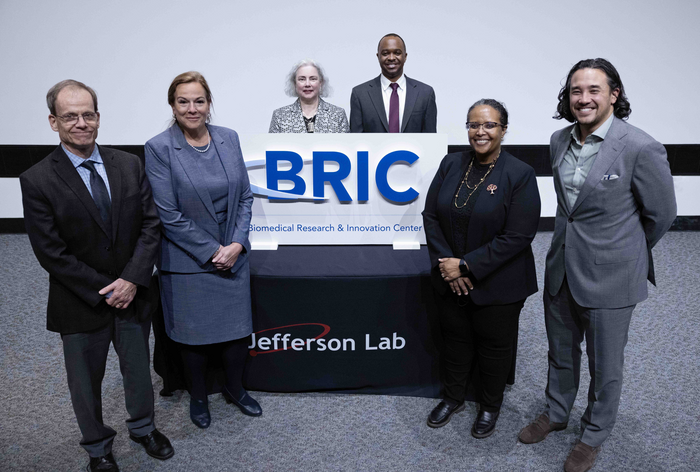NEWPORT NEWS, VA – Better methods for detecting and treating disease. Groundbreaking technologies for monitoring and blocking radiation. New techniques for removing forever chemicals from wastewater. These research and development activities and more are being pursued by innovators at the U.S. Department of Energy’s Thomas Jefferson National Accelerator Facility. And today, they are being brought together to form the lab’s new Biomedical Research & Innovation Center (BRIC).

Credit: Jefferson Lab photo: Aileen Devlin
NEWPORT NEWS, VA – Better methods for detecting and treating disease. Groundbreaking technologies for monitoring and blocking radiation. New techniques for removing forever chemicals from wastewater. These research and development activities and more are being pursued by innovators at the U.S. Department of Energy’s Thomas Jefferson National Accelerator Facility. And today, they are being brought together to form the lab’s new Biomedical Research & Innovation Center (BRIC).
The director of DOE’s Office of Science, Asmeret Asefaw Berhe, gave the keynote address in an event to announce establishment of the center.
“This new center, and indeed all of science, share history and benefit from fundamental scientific research. That is what the Office of Science is all about,” she said. “That fundamental research, in turn, enables greater precision in biomedical research. It is used to spot cancer cells earlier, and drive breakthroughs that improve human health, treat illnesses, and save lives.”
BRIC is the brainchild of Co-Directors Cynthia Keppel and Drew Weisenberger.
“Drew and I were chatting one day, and we were just talking about what should we do to try to look at these disparate projects coherently,” Keppel said. “The idea for BRIC came out of that conversation.”
Jefferson Lab’s mission is to explore the nature of matter. The more than 1,850 scientists who conduct their research here are focused on what the lab’s particle accelerator can do to uncover new information about the nucleus of the atom and enable a better understanding of our universe. Yet, the technologies that enable this exploration may also have the capability to support critical advancements in other fields.
For instance, the detector technologies that Jefferson Lab experts develop, build, test and improve can be used to better image plants in the lab, find hidden tumors in a woman’s breast, or catch radiation and stop it before it reaches groundwater. More efficient particle accelerators can sterilize medical instruments or remove forever chemicals from wastewater with a single zap. And artificial intelligence methods can be applied to healthcare data to root out and help clinicians resolve patient disparities.
“BRIC offers us a way to amplify the biomedical, human health and environment applications that Jefferson Lab scientists and engineers have already been working on separately to address questions in nuclear physics. These are problem solvers who have been looking for ways to use their innovations in new ways, which originally came out of just trying to do nuclear physics,” said Weisenberger.
The new center aims to help these innovators come together with like-minded colleagues. BRIC members remain dedicated to their current departments, with their BRIC membership as an added activity to boost their innovation efforts.
“This opens up new possible avenues for our expertise and gives us something to grow. When our innovators are writing proposals now, they can point to BRIC, and it’s much clearer that there is a mechanism for the lab to support work on different applications of our technologies,” Keppel explained.
The initial BRIC roster includes about two dozen scientists, technicians, engineers and others from all parts of the lab. Keppel and Weisenberger both expect that number to grow as the center finalizes its advisory board and begins its program of regular seminars, workshops, meetings and events.
“The main activities are the research projects, many of which already exist. The center will provide a central location for mutual discussion and collaboration. There’s a desire to have interagency collaboration, for instance, where there’s new challenges to be met,” Keppel added.
The main funding source for the center’s ongoing activities comes from Keppel’s DOE Office of Science Distinguished Scientist Fellow award. Both co-directors expect that the BRIC organization will also jumpstart new projects and collaborations.
“This is why doing basic research is so valuable. It’s not just to understand the universe, which in and of itself is definitely a great motivator,” Weisenberger said. “But it also has more immediate, societal benefits. BRIC will really help us put a spotlight on that sort of work that we’re doing and help attract more people who are interested in working with us and perhaps who are interested in joining us on these projects.”
-end-
Jefferson Science Associates, LLC, manages and operates the Thomas Jefferson National Accelerator Facility, or Jefferson Lab, for the U.S. Department of Energy’s Office of Science.
DOE’s Office of Science is the single largest supporter of basic research in the physical sciences in the United States and is working to address some of the most pressing challenges of our time. For more information, visit https://energy.gov/science.




